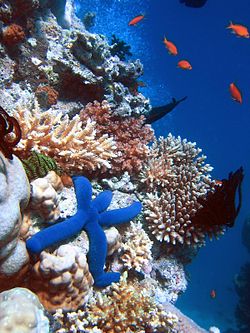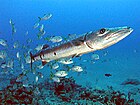| Revision as of 18:04, 18 May 2011 editSburns1313 (talk | contribs)3 editsNo edit summary← Previous edit | Revision as of 19:23, 18 May 2011 edit undoSrchow (talk | contribs)2 edits →Coral ReefsNext edit → | ||
| Line 9: | Line 9: | ||
| ==Coral Reefs== | ==Coral Reefs== | ||
| Coral reef ecosystems are becoming increasingly degraded and in need of conservation. Due to increased carbon in oceans, coral bleaching, diseases, and overfishing there are no pristine reefs anywhere in the world.<ref>J. M. Pandolfi et al., 2003. Global Trajectories of long-term decline of coral reef ecosystems. Science 301: 955-958.</ref> This is especially harmful to island nations such as Samoa, Indonesia, and the Philippines because many people depend on the coral reef ecosystems to feed their families and to make a living. However, many fisherman are unable to catch as many fish as they used to, so they are increasingly using cyanide and dynamite in fishing, which further degrades the coral reef ecosystem.<ref>"CORAL REEF DESTRUCTION AND CONSERVATION - Coral Reefs - Ocean World." Welcome to OceanWorld - Bringing the Ocean to the Classroom. Web. 18 May 2011</ref> Conserving coral reefs has many economic, social, and ecological benefits, not only for the people who live on these islands, but for people throughout the world as well. | Coral reefs are the epicenter for immense amounts of biodiversity, and are a key player in the survival of an entire ecosystem. They provide various marine animals with food, protection, and shelter which keep generations of fish alive.<ref>http://oceanworld.tamu.edu/students/coral/coral4.htm</ref> Furthermore, coral reefs are an integral part of sustaining human life through serving as a food source (i.e. fish, mollusks, etc) as well as a marine space for eco-tourism which provides economic benefits. <ref>Trist, Carolyn. "Recreating Ocean Space: Recreational Consumption and Representation of the Caribbean Marine." Professional Geographer. 51.3 (1999). Print.</ref> | ||
| Unfortunately, coral reef ecosystems are becoming increasingly degraded and in need of conservation. Due to increased carbon in oceans, coral bleaching, diseases, and overfishing there are no pristine reefs anywhere in the world.<ref>J. M. Pandolfi et al., 2003. Global Trajectories of long-term decline of coral reef ecosystems. Science 301: 955-958.</ref> This is especially harmful to island nations such as Samoa, Indonesia, and the Philippines because many people depend on the coral reef ecosystems to feed their families and to make a living. However, many fisherman are unable to catch as many fish as they used to, so they are increasingly using cyanide and dynamite in fishing, which further degrades the coral reef ecosystem.<ref>"CORAL REEF DESTRUCTION AND CONSERVATION - Coral Reefs - Ocean World." Welcome to OceanWorld - Bringing the Ocean to the Classroom. Web. 18 May 2011</ref> Conserving coral reefs has many economic, social, and ecological benefits, not only for the people who live on these islands, but for people throughout the world as well. | |||
| ==Techniques== | ==Techniques== | ||
Revision as of 19:23, 18 May 2011

Marine conservation, also known as marine resources conservation, is the protection and preservation of ecosystems in oceans and seas. Marine conservation focuses on limiting human-caused damage to marine ecosystems, and on restoring damaged marine ecosystems. Marine conservation also focuses on preserving vulnerable marine species.
Overview
Marine conservation is the study of conserving physical and biological marine resources and ecosystem functions. This is a relatively new discipline. Marine conservationists rely on a combination of scientific principles derived from marine biology, oceanography, and fisheries science, as well as on human factors such as demand for marine resources and marine law, economics and policy in order to determine how to best protect and conserve marine species and ecosystems. Marine conservation can be seen as a subdiscipline of conservation biology.
Coral Reefs
Coral reefs are the epicenter for immense amounts of biodiversity, and are a key player in the survival of an entire ecosystem. They provide various marine animals with food, protection, and shelter which keep generations of fish alive. Furthermore, coral reefs are an integral part of sustaining human life through serving as a food source (i.e. fish, mollusks, etc) as well as a marine space for eco-tourism which provides economic benefits.
Unfortunately, coral reef ecosystems are becoming increasingly degraded and in need of conservation. Due to increased carbon in oceans, coral bleaching, diseases, and overfishing there are no pristine reefs anywhere in the world. This is especially harmful to island nations such as Samoa, Indonesia, and the Philippines because many people depend on the coral reef ecosystems to feed their families and to make a living. However, many fisherman are unable to catch as many fish as they used to, so they are increasingly using cyanide and dynamite in fishing, which further degrades the coral reef ecosystem. Conserving coral reefs has many economic, social, and ecological benefits, not only for the people who live on these islands, but for people throughout the world as well.
Techniques
Strategies and techniques for marine conservation tend to combine theoretical disciplines, such as population biology, with practical conservation strategies, such as setting up protected areas, as with marine protected areas (MPAs) or Voluntary Marine Conservation Areas. Other techniques include developing sustainable fisheries and restoring the populations of endangered species through artificial means.
Another focus of conservationists is on curtailing human activities that are detrimental to either marine ecosystems or species through policy, techniques such as fishing quotas, like those set up by the Northwest Atlantic Fisheries Organization, or laws such as those listed below. Recognizing the economics involved in human use of marine ecosystems is key, as is education of the public about conservation issues. This includes educating tourists that come to an area that might not be familiar of certain rules and regulations regarding the marine habitat. One example of this is a project called Green Fins that uses the SCUBA diving industry to educate the public based in SE Asia. This project, implemented by UNEP, encourages scuba diving operators to educate the public they teach to dive about the importance of marine conservation and encourage them to dive in an environmentally friendly manner that does not damage coral reefs or associated marine ecosystems.
Laws and treaties
International laws and treaties related to marine conservation include the 1966 Convention on Fishing and Conservation of Living Resources of the High Seas. United States laws related to marine conservation include the 1972 Marine Mammal Protection Act, as well as the 1972 Marine Protection, Research and Sanctuaries Act which established the National Marine Sanctuaries program.
In 2010, the Scottish Parliament enacted new legislation for the protection of marine life with the Marine (Scotland) Act 2010. The provisions in the Act include: Marine planning, Marine licensing, marine conservation, seal conservation, and enforcement.
Organizations and education

There are marine conservation organizations throughout the world that focus on funding conservation efforts, educating the public and stakeholders, and lobbying for conservation law and policy. Examples of these organizations are Oceana (non-profit group), the Marine Conservation Biology Institute (United States), Blue Frontier Campaign (United States), Frontier (the Society for Environmental Exploration) (United Kingdom), Marine Conservation Society (United Kingdom), The Reef-World Foundation (United Kingdom) and .
On a regional level, PERSGA- the Regional Organization for the Conservation of the Environment of the Red Sea and the Gulf of Aden, is a regional entity serves as the secretariat for the Jeddah Convention-1982, one of the first regional marine agreements. PERSGA Member States are: Djibouti, Egypt, Jordan, Saudi Arabia, Somalia, Sudan and Yemen.
References
- Norse, Elliott A. and Crowder, Larry B. (Eds.) (2005) Marine Conservation Biology: The Science of Maintaining the Sea's Biodiversity, Island Press. ISBN 978-1-55963-662-9
- Primack, Richard B. (1998). "Essentials of conservation biology." 2nd Ed. Sunderland, Ma: Sinauer.
- Ray, G. Carleton and McCormick-Ray, Jerry (eds). (2004). "Coastal-marine conservation: science and policy". Malden, Ma: Blackwell.
- Marine Conservation Biology Institute (MCBI ) Bibliography of resources.
Further reading

- Koslow, Tony (2009). The Silent Deep: The Discovery, Ecology, and Conservation of the Deep Sea. University of Chicago Press. ISBN 9780226451268.
- Lang, Michael A., Ian G. Macintyre, and Klaus Rützler, eds. Proceedings of the Smithsonian Marine Science Symposium. Smithsonian Contributions to the Marine Sciences, no. 38. Washington, D.C.: Smithsonian Institution Scholarly Press, 2009.
External links
- Template:Dmoz
- U.S. National Marine Sanctuary Program
- Advancing Marine Conservation in Cambodia
- Marine Conservation Society UK
- Deep Sea Conservation Coalition
Notes
- http://oceanworld.tamu.edu/students/coral/coral4.htm
- Trist, Carolyn. "Recreating Ocean Space: Recreational Consumption and Representation of the Caribbean Marine." Professional Geographer. 51.3 (1999). Print.
- J. M. Pandolfi et al., 2003. Global Trajectories of long-term decline of coral reef ecosystems. Science 301: 955-958.
- "CORAL REEF DESTRUCTION AND CONSERVATION - Coral Reefs - Ocean World." Welcome to OceanWorld - Bringing the Ocean to the Classroom. Web. 18 May 2011
| Fishery science topics | |||||||||||||||||||||
|---|---|---|---|---|---|---|---|---|---|---|---|---|---|---|---|---|---|---|---|---|---|
| |||||||||||||||||||||
| |||||||||||||||||||||



